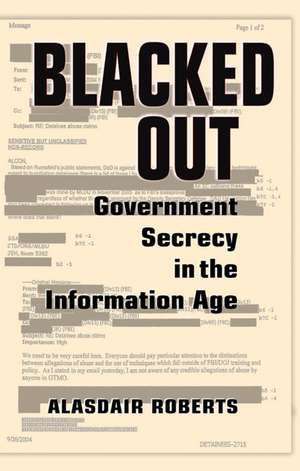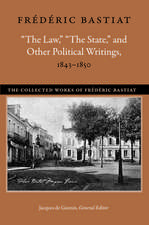Blacked Out: Government Secrecy in the Information Age
Autor Alasdair Robertsen Limba Engleză Paperback – 8 iun 2008
| Toate formatele și edițiile | Preț | Express |
|---|---|---|
| Paperback (1) | 263.79 lei 6-8 săpt. | |
| Cambridge University Press – 8 iun 2008 | 263.79 lei 6-8 săpt. | |
| Hardback (1) | 343.12 lei 6-8 săpt. | |
| Cambridge University Press – 29 ian 2006 | 343.12 lei 6-8 săpt. |
Preț: 263.79 lei
Nou
Puncte Express: 396
Preț estimativ în valută:
50.47€ • 52.70$ • 41.78£
50.47€ • 52.70$ • 41.78£
Carte tipărită la comandă
Livrare economică 05-19 aprilie
Preluare comenzi: 021 569.72.76
Specificații
ISBN-13: 9780521731546
ISBN-10: 0521731542
Pagini: 336
Ilustrații: black & white illustrations
Dimensiuni: 150 x 226 x 23 mm
Greutate: 0.45 kg
Ediția:1
Editura: Cambridge University Press
Colecția Cambridge University Press
Locul publicării:New York, United States
ISBN-10: 0521731542
Pagini: 336
Ilustrații: black & white illustrations
Dimensiuni: 150 x 226 x 23 mm
Greutate: 0.45 kg
Ediția:1
Editura: Cambridge University Press
Colecția Cambridge University Press
Locul publicării:New York, United States
Cuprins
1. The glass case; Part I. Context: 2. Secrecy and security; 3. Gulliver; 4. Message discipline; 5. Soft states; Part II. Structure: 6. Opaque networks; 7. The corporate evil; 8. Remote control; Part III. Technology: 9. Liquid paper; Part IV. Conclusion: 10. We like to watch; Notes.
Recenzii
Alasdair Roberts' Blacked Out is a fast-paced, well-informed and engrossing account of the emergence of a worldwide movement to hold governments accountable by requiring them to disclose information they would rather withhold to conceal corruption, bureaucratic incompetence, environmental degradation, human rights abuses and other misconduct. It is essential reading for proponents of open societies.
-Aryeh Neier, President, Open Society Institute
"Alasdair Roberts has written a monumentally important book, not only about secrecy and the right-to-know movement, but about the deeply troubling 'ethic of detachment' and quiescence of the American public. What good is significant information about abuses of power if there is no accountability, if no one acts on that information?"
-Charles Lewis, President, The Fund for Independence in Journalism
"Professor Roberts provides keen insights into the power struggle over secretiveness in supranational institutions...Blacked Out makes it crystal clear that the game has changed drastically when it comes to guarding citizens' right to information about the activities conducted by governments and their private surrogates."
-Doris Graber, University of Illinois
"Blacked Out, is an accessible and detailed account of the rise and partial fall of the information disclosure culture in governments around the world."
-Craig Forcese, Ottawa Law Review
"Roberts describes the tactics that politicians and bureaucrats have used to preserve government secrecy, explains how profound changes in the structure of government-notably privatization of public services-are complicating campaigns for openness, and notes how new information technologies sometimes enhance openness, but sometimes create barriers."
-Future Survey
-Aryeh Neier, President, Open Society Institute
"Alasdair Roberts has written a monumentally important book, not only about secrecy and the right-to-know movement, but about the deeply troubling 'ethic of detachment' and quiescence of the American public. What good is significant information about abuses of power if there is no accountability, if no one acts on that information?"
-Charles Lewis, President, The Fund for Independence in Journalism
"Professor Roberts provides keen insights into the power struggle over secretiveness in supranational institutions...Blacked Out makes it crystal clear that the game has changed drastically when it comes to guarding citizens' right to information about the activities conducted by governments and their private surrogates."
-Doris Graber, University of Illinois
"Blacked Out, is an accessible and detailed account of the rise and partial fall of the information disclosure culture in governments around the world."
-Craig Forcese, Ottawa Law Review
"Roberts describes the tactics that politicians and bureaucrats have used to preserve government secrecy, explains how profound changes in the structure of government-notably privatization of public services-are complicating campaigns for openness, and notes how new information technologies sometimes enhance openness, but sometimes create barriers."
-Future Survey
Notă biografică
Descriere
This 2006 book examines the evolution of the move toward openness in government.














